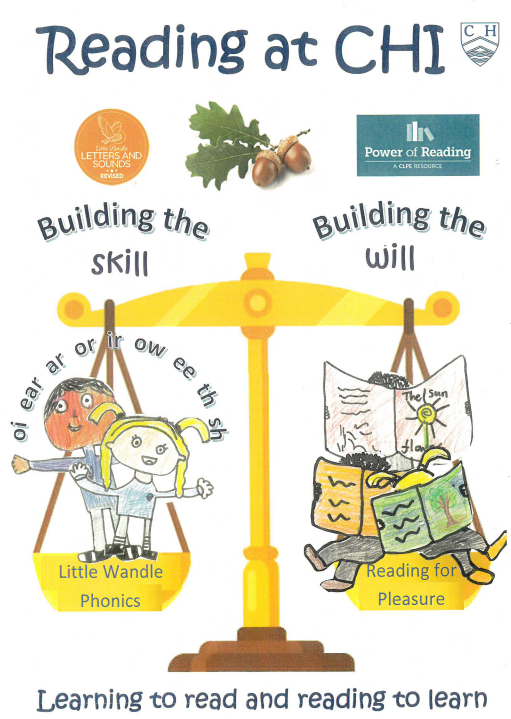Reading

We believe in motivating all of our children to learn to read and to develop a love of reading for pleasure. We achieve this through our rigorous implementation of our Phonics Scheme and the CLPE Power of Reading approach. This approach helps improve children's engagement with reading and positively impacts their writing. Our staff are well trained in teaching phonics and early reading. Through regular book shares as part of our CPD, we continually develop our teachers' knowledge of childrens’ literature and new books which reflect the realities of our school community.
Below are overview documents from the Little Wandle Letters and Sounds Revised phonics programme. They show the order in which the sounds and tricky words are taught during Reception and Year 1.
We fill our days with stories, poetry and rhyme. We aim for a 5-a-day approach to reading. Each class has a poem at the beginning of the day, a special story time at the end of the day, as well as many opportunities for whole class reading throughout the day. The children read instructions, look at books related to their learning, read the day and the date on the board, refer to the class visual timetable, access labelled resources etc and read text from the Interactive White Board.
Curriculum Intent
Reading is such an important life skill, and it is at the heart of everything we do. Our staff agrees that we are aiming for the same endpoint - children who enjoy reading, read widely and often and have age-appropriate fluency, prosody (pitch, stress and timing) and comprehension. Our reading curriculum is designed to provide a balanced and engaging approach to developing reading skills, which include both decoding and comprehension. We are a CLPE Associate School and our focus on high quality texts helps excite and engage children and develops resilience and stamina for reading.
‘Reading for pleasure is the single most important indicator of a child’s success.’ (OECD 2002)
‘The will influences the skill and vice versa.’ (OECD 2010)
Curriculum Implementation
All staff have a clear and ambitious vision for providing high quality teaching of reading.
- Rigorous, sequential approach to teaching reading
- Reading materials closely matched to children’s phonic knowledge
- Reading attainment - assessed - gaps addressed quickly and effectively
- Sharp focus on phonics knowledge and language comprehension which are necessary to read and give children the skills to communicate - foundations for future learning
- Teacher’s own speaking, listening, writing and reading of English, supports children in developing their language and vocabulary
Oracy in all subjects
Our curriculum design allows for as many speaking opportunities as possible as our teachers understand that speaking and listening are at the heart of language. Not only are they the foundations for reading and writing, they are also essential skills for thinking and communication. Our teachers are role models for good spoken English, using ambitious vocabulary and correct grammar. Children are encouraged to read aloud, discuss ideas with their peers and teachers, engage with and learn new vocabulary to extend their spoken and receptive vocabulary.
Phonics (reading and spelling)
Systematic Synthetic Phonics is the foundation which allows young readers to learn the sounds progressively, access simple texts and engage in early reading. All of our staff have completed accredited Little Wandle Letters & Sounds Revised training.
At Coombe Hill Infants’ School, we believe that all our children can become fluent readers and writers. This is why we teach reading through Little Wandle Letters and Sounds Revised, which is a systematic and synthetic phonics programme. We start teaching phonics in Reception and follow the Little Wandle Letters and Sounds Revised progression, which ensures children build on their growing knowledge of the alphabetic code, mastering phonics to read and spell as they move through school.
Daily phonics lessons in Reception and Year 1
- We teach phonics for 30 minutes a day. In Reception, we build from 10-minute lessons, with additional daily oral blending games, to the full-length lesson as quickly as possible. Each Friday, we review the week’s teaching to help children become fluent readers.
- Children make a strong start in Reception: teaching begins in Week 2 of the Autumn term.
As each sound is taught, the children begin to segment (sound out) and blend (put the letters together to make words) so they can read and write. As soon as a child is taught “s, a, t, p, i n etc, they will learn to segment and blend the letters to read and write the words sat, sit pin, pat, tap tin.
We follow the Little Wandle Letters and Sounds Revised expectations of progress:
- Children in Reception are taught to read and spell words using Phase 2 and 3 GPCs, and words with adjacent consonants (Phase 4) with fluency and accuracy.
- Children in Year 1 review Phase 3 and 4 and are taught to read and spell words using Phase 5 GPCs with fluency and accuracy.
Daily Keep-up lessons ensure every child learns to read
- Any child who needs additional practice has daily Keep-up support, taught by a fully trained adult. Keep-up lessons match the structure of class teaching, and use the same procedures, resources and mantras, but in smaller steps with more repetition, so that every child secures their learning.
- We timetable daily phonics lessons for any child in Year 2 who is not fully fluent at reading or has not passed the Phonics Screening Check. These children need to catch up, so the gap between themselves and their peers does not widen. We use the Little Wandle Letters and Sounds Revised assessments to identify the gaps in their phonic knowledge and teach to these using the Keep-up resources – at pace.
As a result, all our children are able to tackle any unfamiliar words as they read. At Coombe Hill Infants School, we also model the application of the alphabetic code through phonics in shared reading and writing, both inside and outside of the phonics lesson and across the curriculum. We have a strong focus on language development for our children because we know that speaking and listening are crucial skills for reading and writing in all subjects.
Please follow this link to find resources that will help you support your child with saying their newly learned sounds. You will also find some useful videos showing how your child is taught at school. We hope this will help you feel confident about supporting their reading at home.
In June, the children in Year 1 are tested on their phonics in a National Phonics Screening check. This is a check of 20 real words and 20 alien (non-words) words. Parents will receive their child’s results with their end of term Report. Our school results are listed here and at the bottom of this page, together with the national and RBK results.
In Year 2, the pupils revise previously taught phonemes (sounds) and graphemes (ways of writing the sounds) and learn a range of new ones. Children who do not meet the expected standard in the Year 1 National Phonics Screening, are expected to repeat it in Year 2.
Guided reading, shared reading, 1:1 reading, whole-class reading
Our curriculum provides reading opportunities in all areas of learning. Reading skills are explicitly taught through group reading sessions, shared or 1:1 reading, according to the needs of the child. Until children are secure in Phase 5 of the Little Wandle SSP (Systematic Synthetic Phonics) Programme, books are chosen carefully to match each child’s phonic and reading ability.
Our library is used by all the children and has been stocked with a diverse range of high quality texts to engage all readers.
We fill our days with stories, poetry and rhyme. We aim for a 5-a-day approach to reading. Each class has a poem at the beginning of the day, a special story time at the end of the day, as well as many opportunities for whole class reading throughout the day. The children read instructions, look at books related to their learning, read the day and the date on the board, refer to the class visual timetable, access labelled resources etc and read text from the Interactive White Board.
Comprehension and Prosody
At Coombe Hill Infants School, we value reading as a crucial life skill. By the time children leave us, they read confidently for meaning and regularly enjoy reading for pleasure. Our readers are equipped with the tools to tackle unfamiliar vocabulary. We understand the importance of developing the skills of comprehension and prosody as well as the decoding and tricky word reading skills. This ensures that children learn to read and comprehend at the same speed, develop an enjoyment of a variety of books and learn to love reading. We teach this skill through reading to and with the children regularly. We encourage our children to see themselves as readers for both pleasure and purpose.
We teach the children to read, so they can read to learn.
Looking For a Good Book? Click the links below!
